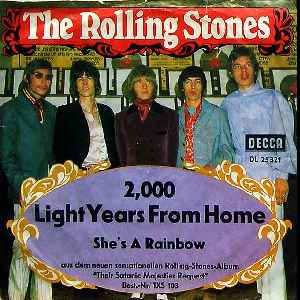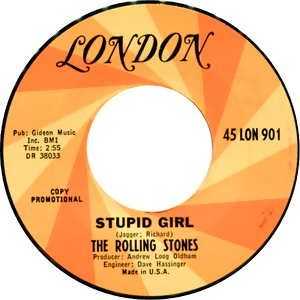
"Jumpin' Jack Flash" is a song by the English rock band the Rolling Stones, released as a non-album single in 1968. Called "supernatural Delta blues by way of Swinging London" by Rolling Stone magazine, the song was seen as the band's return to their blues roots after the baroque pop and psychedelia heard on their preceding albums Aftermath (1966), Between the Buttons (1967) and especially Their Satanic Majesties Request (1967). One of the group's most popular and recognisable songs, it has been featured in films and covered by numerous performers, notably Thelma Houston, Aretha Franklin, Tina Turner, Peter Frampton, Johnny Winter, Leon Russell and Alex Chilton. To date, it is the band's most-performed song; they have played it over 1,100 times in concert.

"Sympathy for the Devil" is a song by English rock band the Rolling Stones. The song was written by Mick Jagger and credited to the Jagger–Richards partnership. It is the opening track on the band's 1968 album Beggars Banquet. The song has received critical acclaim and features on Rolling Stone magazine's "The 500 Greatest Songs of All Time" list, being ranked number 106 in the 2021 edition.

"Not Fade Away" is a song credited to Buddy Holly and Norman Petty and first recorded by Holly and his band, the Crickets.

"Ruby Tuesday" is a song by the English rock band the Rolling Stones, released in January 1967. The song became the band's fourth number-one hit in the United States and reached number three in the United Kingdom as a double A-side with "Let's Spend the Night Together". The song was included in the American version of Between the Buttons.

"Honky Tonk Women" is a song by the English rock band the Rolling Stones. It was released as a non-album single in July 1969 in the United Kingdom, and a week later in the United States. It topped the charts in both nations. The song was on Rolling Stone's 500 Greatest Songs of All Time list, and was inducted into the Grammy Hall of Fame.

"Let's Spend the Night Together" is a song written by Mick Jagger and Keith Richards, and originally released by the Rolling Stones as a double A-sided single together with "Ruby Tuesday" in January 1967. It also appears as the opening track on the American version of their album Between the Buttons. The song has been covered by various artists, including David Bowie in 1973.

"Get Off of My Cloud" is a song by the English rock band the Rolling Stones. It was written by Mick Jagger and Keith Richards for a single to follow the successful "(I Can't Get No) Satisfaction". Recorded at RCA Studios in Hollywood, California, in early September 1965, the song was released in September in the United States and October in the United Kingdom. It topped the charts in the US, UK, Canada, and Germany and reached number two in several other countries.

"Out of Time" is a song by the Rolling Stones, first released on their 1966 album Aftermath. The most commercially successful version of the song was by Chris Farlowe, an English solo artist. Farlowe's single, produced by Mick Jagger, peaked at number one in the UK Singles Chart on 28 July 1966 and stayed at the top for one week. A shorter alternative mix of the Rolling Stones' recording was released in the US in 1967 on the album Flowers. A third version featuring Jagger's lead vocal and the orchestration and backing vocals from Farlowe's cover version was released on the 1975 rarities album Metamorphosis and as a single.

"Have You Seen Your Mother, Baby, Standing in the Shadow?" is a song by the English rock band the Rolling Stones. Written by Mick Jagger and Keith Richards, it was recorded in the late summer of 1966 during early sessions for what would become their Between the Buttons album. It was the first Stones single to be released simultaneously in both the UK and the US, and reached number five and number nine on those countries' charts, respectively.

"Mother's Little Helper" is a song by the English rock band the Rolling Stones. A product of Mick Jagger and Keith Richards' songwriting partnership, it is a folk rock song with Eastern influences. Its lyrics deal with the popularity of prescribed tranquilisers like Valium among housewives and the potential hazards of overdose or addiction. Recorded in December 1965, it was first released in the United Kingdom as the opening track of the band's April 1966 album, Aftermath. In the United States, it was omitted from the album and instead issued as a single in July 1966 during the band's fifth American tour. The Rolling Stones' twelfth US single, "Mother's Little Helper" spent nine weeks on the US Billboard Hot 100, peaking at No. 8, and it reached No. 4 on both Record World and Cash Box's charts.
"Ride On, Baby" is a song by English rock band the Rolling Stones. It was written by Mick Jagger and Keith Richards in 1965. It was first released as a single by Chris Farlowe in October 1966 and reached No. 31 on the British charts. The Rolling Stones' own version appeared a few months later on Flowers, an album released only in the US in June 1967. It was recorded during the Aftermath sessions in December 1965.
Yesterday's Papers is a song by the Rolling Stones from their 1967 album, Between the Buttons. It was the first song that Mick Jagger wrote by himself for the group. It appears as the opening track on the UK version of the album and on the US version as the second track.
"Sweet Virginia" is a song written by Mick Jagger and Keith Richards, and was the sixth song on the Rolling Stones' 1972 double album Exile on Main St. The song is a slow country-inspired composition with a saxophone solo.

"Dandelion" is a song by the English rock band the Rolling Stones, written by Mick Jagger and Keith Richards, and first released as a B-side to "We Love You" in August 1967. As recently as October 2023 Keith Richards confirmed that John Lennon and Paul McCartney sing backing vocals. Billboard described the single as "an easy beat rocker with good story line."

"19th Nervous Breakdown" is a song recorded by the English rock band the Rolling Stones. Written by Mick Jagger and Keith Richards, it was recorded in late 1965 and released as a single in February 1966. It reached number 2 on both the US Billboard Hot 100 and Britain's Record Retailer chart, while topping the charts compiled by Cash Box and NME.
"Goin' Home" is a song recorded by the English rock band the Rolling Stones. Written by Mick Jagger and Keith Richards, it was the longest popular music song at the time, coming in at 11 minutes and 35 seconds, and was the first extended rock improvisation released by a major recording act. It was included as the sixth track on side one of the United Kingdom version and the fifth track on side two of the American version of the band's 1966 studio album Aftermath.

"2000 Light Years from Home" is a song by the English rock band the Rolling Stones, released on their 1967 album Their Satanic Majesties Request. Written by Mick Jagger and Keith Richards, it also appeared as the B-side to the American single "She's a Rainbow", and charted as a single in Germany.
"Think" is a Mick Jagger and Keith Richards composition. It first appeared as a Chris Farlowe single which reached No 37 on the UK Singles Chart in January 1966. The Rolling Stones' own version appeared, three months later, on their Aftermath album, with a rewritten third verse.

"Stupid Girl" is a song recorded by the English rock band the Rolling Stones. Written by Mick Jagger and Keith Richards, the song featured on the band's 1966 album Aftermath. It was also issued as the B-side of the U.S. "Paint It Black" single.
"I Am Waiting" is a song recorded by the English rock band the Rolling Stones. It was written by Mick Jagger and Keith Richards and released on the band's 1966 studio album Aftermath.













